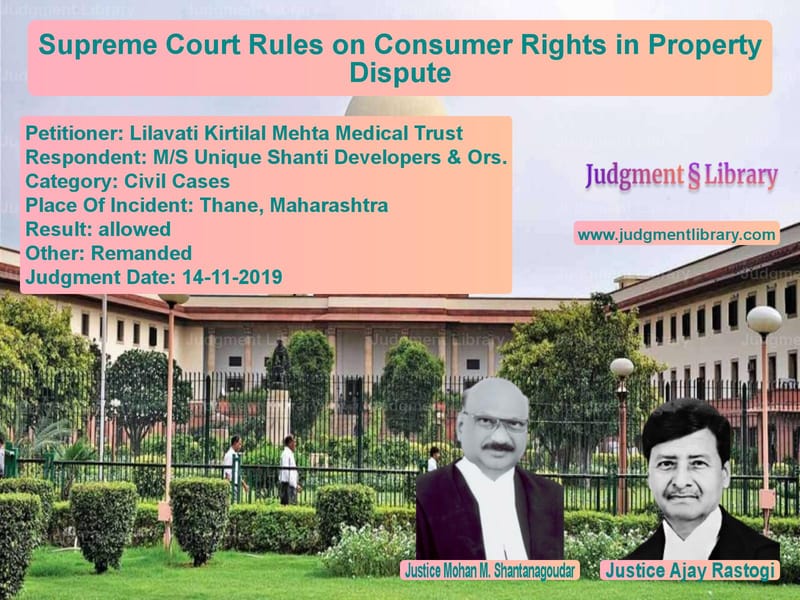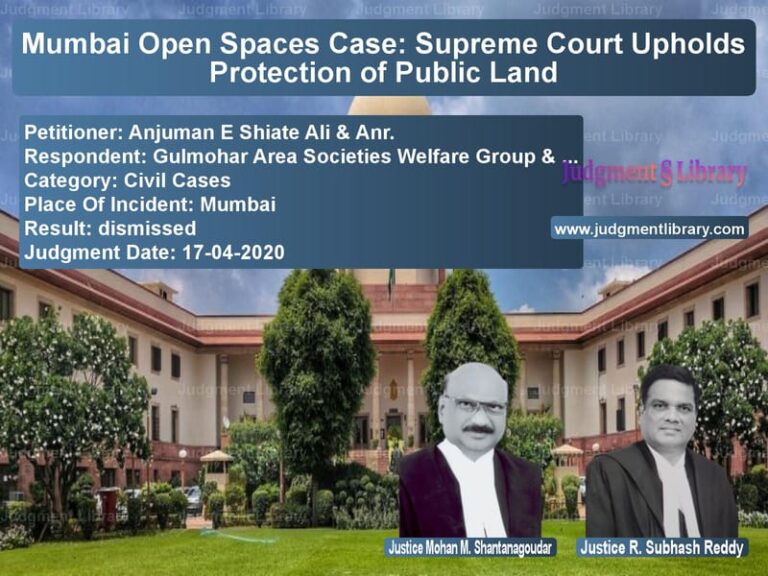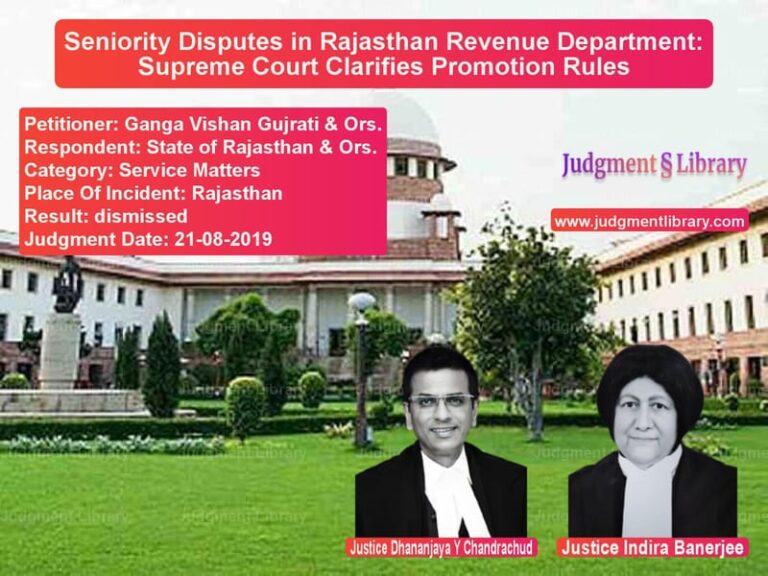Supreme Court Rules on Consumer Rights in Property Dispute
The Supreme Court of India, in its judgment dated November 14, 2019, delivered a significant ruling in the case of Lilavati Kirtilal Mehta Medical Trust vs. M/S Unique Shanti Developers & Ors.. The case revolved around whether a charitable medical trust, which had purchased flats for providing accommodation to nurses, could be considered a ‘consumer’ under the Consumer Protection Act, 1986. This ruling has profound implications for consumer rights, real estate disputes, and the interpretation of the term ‘consumer’ in India.
Background of the Case
The appellant, Lilavati Kirtilal Mehta Medical Trust, entered into an agreement with the respondent, M/S Unique Shanti Developers, for purchasing 29 flats in a building named ‘Madhuvan’ located in Shanti Park, Thane, Maharashtra. These flats were intended to be used as hostel facilities for nurses employed at Lilavati Hospital, which is run by the trust.
The sale agreements were executed on November 25, 1995, and were registered on March 16, 1996. The trust paid the full purchase price, and a completion certificate was issued on February 17, 1997. However, within a few years, the building allegedly began to deteriorate due to poor construction quality. By 2002, the trust was forced to vacate the nurses from the flats, rendering them uninhabitable.
Key Issues in the Case
- Whether an organization, such as a medical trust, that purchases flats for housing its employees qualifies as a ‘consumer’ under the Consumer Protection Act, 1986.
- Whether the delay in filing the consumer complaint (from 2002 to 2016) was justifiable.
- Whether the developer committed fraud by obtaining an occupation certificate despite the alleged substandard construction.
- Whether the National Consumer Disputes Redressal Commission (NCDRC) erred in dismissing the complaint.
Petitioner’s (Medical Trust) Arguments
The appellant, Lilavati Kirtilal Mehta Medical Trust, presented the following key arguments:
- The flats were acquired not for commercial gain but as a welfare measure for nurses. This was a non-profit activity and should not disqualify them from being considered consumers.
- The building was uninhabitable due to major structural defects, with damages so severe that the cost of repairs was higher than the cost of reconstruction.
- The developers fraudulently obtained an occupation certificate despite the building being of substandard quality.
- The delay in filing the complaint was justified due to internal litigation regarding the management of the trust, which had stalled action.
Respondent’s (Developers) Arguments
The respondent, M/S Unique Shanti Developers, countered the trust’s claims with the following arguments:
- The complaint was time-barred, as the trust had vacated the flats in 2002 but filed the case only in 2016—well beyond the two-year limitation period under the Consumer Protection Act.
- The trust could not be considered a ‘consumer’ under Section 2(1)(d) of the Consumer Protection Act, as the flats were used for a purpose linked to a commercial hospital.
- The trust’s claims for damages and future rent loss were speculative and unsupported by evidence.
Supreme Court’s Observations
The Supreme Court analyzed the case by referring to past judgments, including Laxmi Engineering Works vs. P.S.G. Industrial Institute (1995), which established the ‘dominant purpose’ test to determine consumer status. The Court made the following key observations:
- The acquisition of flats to house nurses was a welfare measure and not a profit-driven activity.
- The trust’s purchase of flats for employee accommodation was incidental to its primary function and did not constitute a commercial activity.
- Providing housing to employees does not disqualify an organization from consumer status under the Consumer Protection Act.
- Developers must be held accountable for substandard construction, and buyers should have the right to seek redress.
Final Judgment
The Supreme Court overturned the NCDRC’s ruling and held that the trust qualified as a ‘consumer’ under the Consumer Protection Act. The matter was remanded to the NCDRC for fresh adjudication based on the merits of the case.
Impact of the Judgment
This landmark ruling has far-reaching implications:
- Broadening of Consumer Definition: The judgment recognizes that entities purchasing goods or services for employee welfare are entitled to consumer rights.
- Increased Liability for Builders: The ruling reinforces that developers must deliver projects of the promised quality and can be held accountable for defects.
- Protection for Institutional Buyers: Schools, hospitals, and trusts purchasing real estate for legitimate welfare activities can now claim consumer protection.
Conclusion
The Supreme Court’s ruling in Lilavati Kirtilal Mehta Medical Trust vs. M/S Unique Shanti Developers sets a significant precedent in consumer protection law. It ensures that welfare-driven purchases are not treated as commercial transactions, thereby strengthening consumer rights in India’s real estate sector.
Petitioner Name: Lilavati Kirtilal Mehta Medical Trust.Respondent Name: M/S Unique Shanti Developers & Ors..Judgment By: Justice Mohan M. Shantanagoudar, Justice Ajay Rastogi.Place Of Incident: Thane, Maharashtra.Judgment Date: 14-11-2019.
Don’t miss out on the full details! Download the complete judgment in PDF format below and gain valuable insights instantly!
Download Judgment: Lilavati Kirtilal Me vs MS Unique Shanti De Supreme Court of India Judgment Dated 14-11-2019.pdf
Direct Downlaod Judgment: Direct downlaod this Judgment
See all petitions in Property Disputes
See all petitions in Consumer Rights
See all petitions in Damages and Compensation
See all petitions in Judgment by Mohan M. Shantanagoudar
See all petitions in Judgment by Ajay Rastogi
See all petitions in allowed
See all petitions in Remanded
See all petitions in supreme court of India judgments November 2019
See all petitions in 2019 judgments
See all posts in Civil Cases Category
See all allowed petitions in Civil Cases Category
See all Dismissed petitions in Civil Cases Category
See all partially allowed petitions in Civil Cases Category







